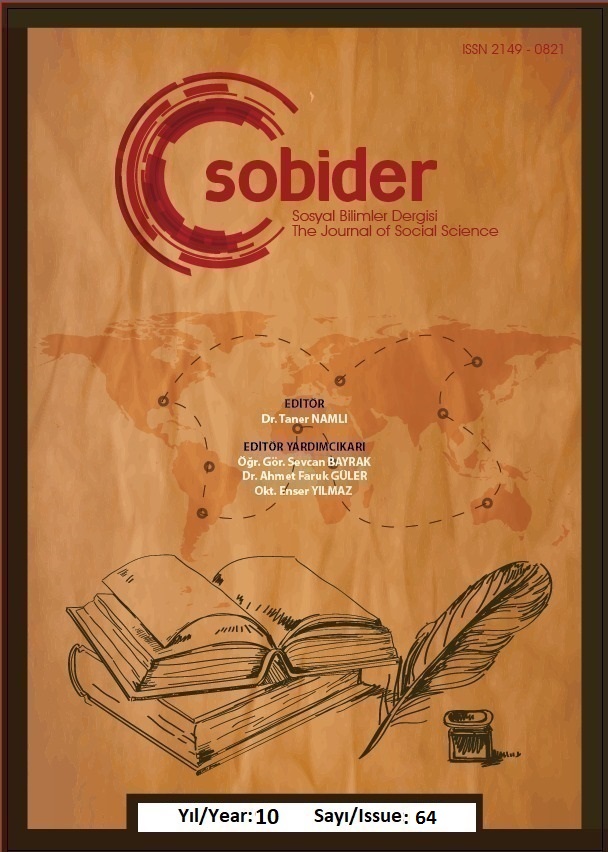Author :
Abstract
Edebiyat, özellikle roman, toplum için bir ayna gibidir. Roman, hikâye ve şiir gibi edebî eserler, kişisel üretimlerin yanı sıra dönemin sosyal, ekonomik ve siyasi meselelerini de yansıtır. Bu nedenle edebi eserler de sosyolojik kaynak olarak kabul edilebilir. 19. Ve 20. yüzyıl Türk ve Rus edebiyatı, büyük yazarların tüm dünyada ün kazandığı yüzyıldır. 19. Ve 20. yüzyılda Türk ve Rus edebiyatının zirvesi kabul edilen isimler toplumsal konulara kayıtsız kalmamalarının yanı sıra Türk ve Rus toplumunun modernleşme sürecini de eserlerinde yorumlamışlardır. Entelektüeller genellikle bu merkezlerde yoğunlaştıkça, düşünce, bilim ve edebiyat siyaseti de bu merkezlerde yoğunlaşmıştır. Dönemin en önemli dergi ve gazeteleri bu edebiyatçılarla ilgili basılıp dağıtılıyordu. Tarih boyunca siyasi iktidar, kendi amaçlarına hizmet etmek, rejimlerini korumak ve toplumsal hegemonyalarını sağlamlaştırmak için örgütlü aydınlara ihtiyaç duymuştur. Yüzyıllardır enformasyonu tekelleştiren aydınlar, kültürel sermayelerini çoğu zaman kendi sınıfsal amaçları için kullanarak, bazen siyasi iktidarla çatışan, bazen de uzlaşmaya varan ideolojiler üretmişlerdir. Bu çatışma ve uzlaşma ekseninde, aydının idari yapıya karşı tutumu, yönetici sınıfın statükoyu koruma çabası, yerel ve evrensel sorunlar, iktidarla ilişkisi tanımlanmaktadır. Bu bakımdan aydınların her toplumdaki konumu ve rolü farklıdır. Aslında Batı toplumlarında muhalif kimliği ve iktidar eleştirisi ile öne çıkan entelektüelin işlevi, Batı dışı toplumlarda iktidarın yönetsel işlevlerini yerine getirmek ve bilgisiyle iktidarı meşrulaştırmaktır. Klasik Osmanlı İmparatorluğu'nda iktidarın (devletin) "koruma", Tanzimat döneminde ise "kurtarma" (diriliş) döneminde Türk aydınlarının, tarihsel, toplumsal ve sınıfsal kategorilerdeki entelektüellerin işlevleri söz konusudur. Bu çalışmada ele alınan Türk ve Rus aydınların kısaca bilgileri verilmiştir.
Keywords
Abstract
Literature, especially the novel, is like a mirror for society. Literary works such as novels, stories and poems reflect the social, economic, and political issues of the period as well as personal productions. For this reason, literary works can also be accepted as sociological resources. 19th and 20th century Turkish and Russian literature is the century when great writers became famous all over the world. The names considered the pinnacle of Turkish and Russian literature in the 19th and 20th centuries, not only did not remain indifferent to social issues, but also interpreted the modernization process of Turkish and Russian society in their works. As the intellectuals generally concentrated in these centres, the politics of thought, science and literature were also concentrated in these centres. The most important magazines and newspapers of the period were printed and distributed about these men of letters. Throughout history, political power has needed organized intellectuals to serve its own purposes, protect their regimes and consolidate their social hegemony. Intellectuals, who have monopolized information for centuries, have produced ideologies that sometimes conflict with the political power and sometimes reach consensus, using their cultural capital for their own class purposes. In this context of conflict and reconciliation, the attitude of the intellectual towards the administrative structure, the effort of the ruling class to protect the status quo, local and universal problems, and its relationship with the power are defined. In this respect, the position and role of intellectuals in every society is different. In fact, the function of the intellectual, who stands out with his oppositional identity and criticism of power in Western societies, is to fulfill the administrative functions of power in non-Western societies and to legitimize power with his knowledge. The functions of Turkish intellectuals, intellectuals in historical, social and class categories are in question in the period of "protection" of the power (state) in the classical Ottoman Empire, and in the period of "rescue" (resurrection) in the Tanzimat period. Brief information about the Turkish and Russian intellectuals discussed in this study is given.
